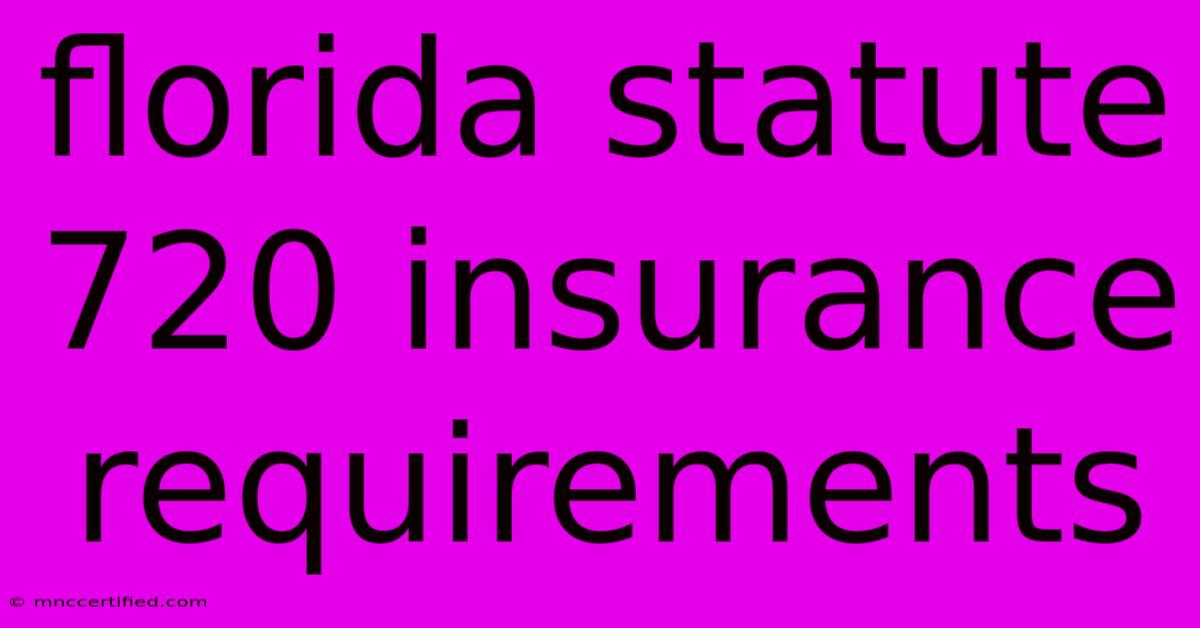Florida Statute 720 Insurance Requirements

Table of Contents
Demystifying Florida Statute 720: Understanding Insurance Requirements
Florida Statute 720, also known as the "Florida Motor Vehicle No-Fault Law," establishes a comprehensive set of insurance requirements for all drivers in the Sunshine State. This statute aims to provide financial protection for individuals involved in motor vehicle accidents, ensuring they have access to essential medical treatment and other benefits.
Understanding Florida Statute 720 is crucial for all drivers, as failure to comply can lead to significant penalties. Let's delve into the key provisions of this statute and how they affect you.
What Does Florida Statute 720 Require?
Florida Statute 720 mandates that all vehicle owners and operators must maintain the following insurance coverage:
- Personal Injury Protection (PIP): This coverage provides medical benefits to the insured person, regardless of fault, for injuries sustained in a motor vehicle accident. PIP covers up to $10,000 in medical expenses, including ambulance, hospital, physician, and rehabilitation services.
- Property Damage Liability (PDL): This coverage protects the insured against financial losses caused by damage to another person's property in an accident. The minimum coverage requirement is $10,000.
- Bodily Injury Liability (BIL): This coverage protects the insured against financial losses arising from injuries to another person in an accident. Florida requires a minimum coverage of $10,000 per person and $20,000 per accident.
Understanding the "No-Fault" System
The "no-fault" system in Florida means that an individual can typically seek compensation for medical expenses and lost wages directly from their own insurance company, regardless of who caused the accident. However, there are exceptions to this rule, such as when:
- The injuries are severe and exceed the PIP coverage limit.
- The accident was caused by a driver who was uninsured or underinsured.
- The injuries were caused by a hit-and-run driver.
In these instances, the injured party may have to pursue legal action against the at-fault driver or their insurance company.
Exemptions and Specific Considerations
Florida Statute 720 also includes exemptions for certain vehicles and situations. For instance:
- Motorcycles: Motorcycles are exempt from the PIP coverage requirement, but they still need to carry PDL and BIL coverage.
- Government Vehicles: Government-owned vehicles are not subject to the same insurance requirements as privately owned vehicles.
- Certain Commercial Vehicles: Some commercial vehicles, such as those transporting agricultural products, are exempt from PIP coverage.
Consequences of Non-Compliance
Failing to maintain the required insurance coverage under Florida Statute 720 can result in severe penalties, including:
- Fines: Drivers caught without the required insurance face hefty fines, potentially reaching hundreds of dollars.
- License Suspension: Your driver's license can be suspended if you are repeatedly found driving without insurance.
- Vehicle Impoundment: Your vehicle may be impounded until you provide proof of insurance.
- Jail Time: In some cases, driving without insurance can lead to jail time.
Protecting Yourself: What You Need to Do
To ensure compliance with Florida Statute 720 and avoid potential penalties, it's crucial to:
- Maintain Adequate Coverage: Review your insurance policy regularly to ensure it meets the minimum requirements set forth in Florida Statute 720.
- Carry Proof of Insurance: Always carry proof of insurance in your vehicle, such as your insurance card or a digital copy.
- Be Aware of Exemptions: Understand which vehicles and situations may be exempt from certain insurance requirements.
Conclusion
Florida Statute 720 plays a vital role in safeguarding drivers and ensuring financial protection in the event of an accident. By understanding the requirements of this statute and maintaining the necessary insurance coverage, you can avoid potential penalties and ensure peace of mind while driving on Florida's roads.

Thank you for visiting our website wich cover about Florida Statute 720 Insurance Requirements. We hope the information provided has been useful to you. Feel free to contact us if you have any questions or need further assistance. See you next time and dont miss to bookmark.
Featured Posts
-
Stats Brugge 1 0 Villa Ucl Campaign Over
Nov 07, 2024
-
Health Insurance Responsibility Disclosure
Nov 07, 2024
-
Tuition And Fees Grand View 2024 25
Nov 07, 2024
-
Chapter 8 Covalent Bonding Answer Key Pdf
Nov 07, 2024
-
Ethereum Investment Return 1000 In 2018
Nov 07, 2024